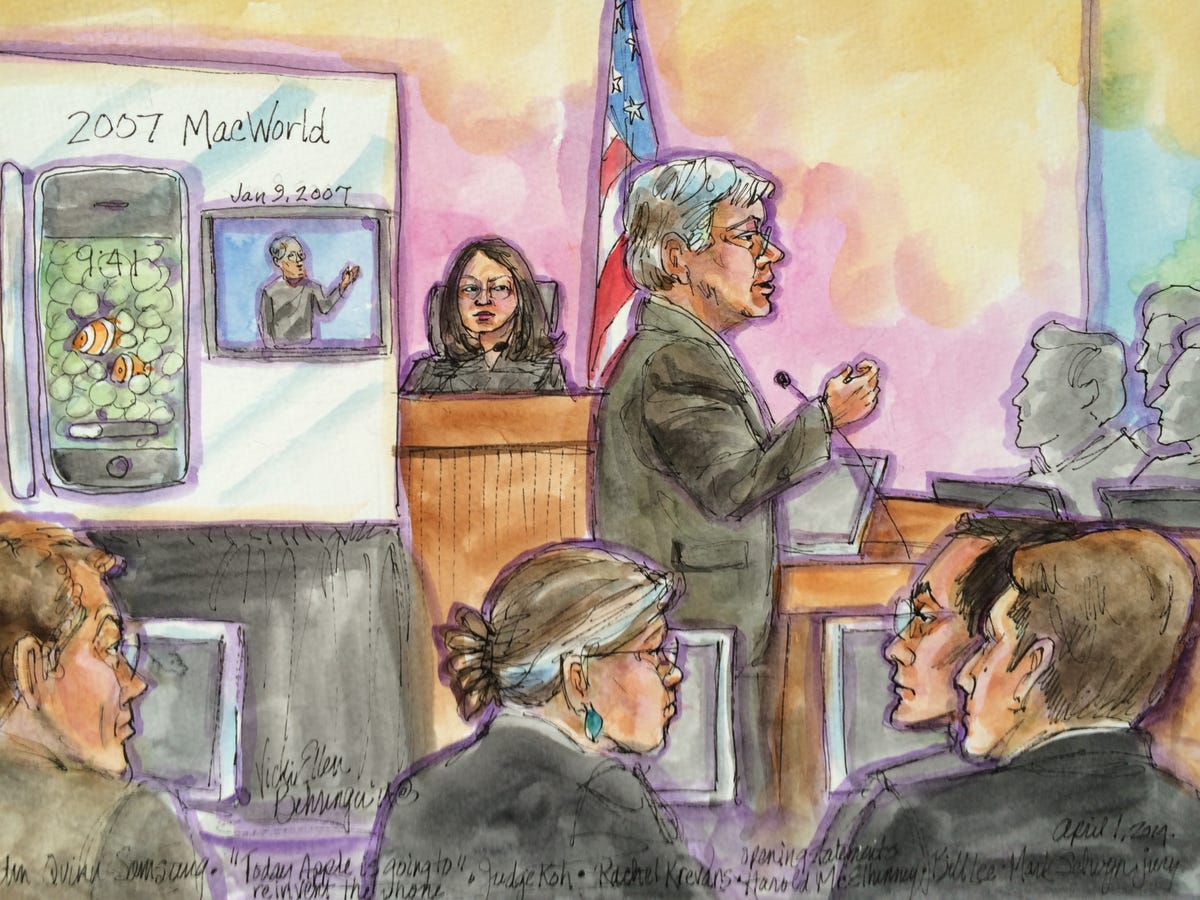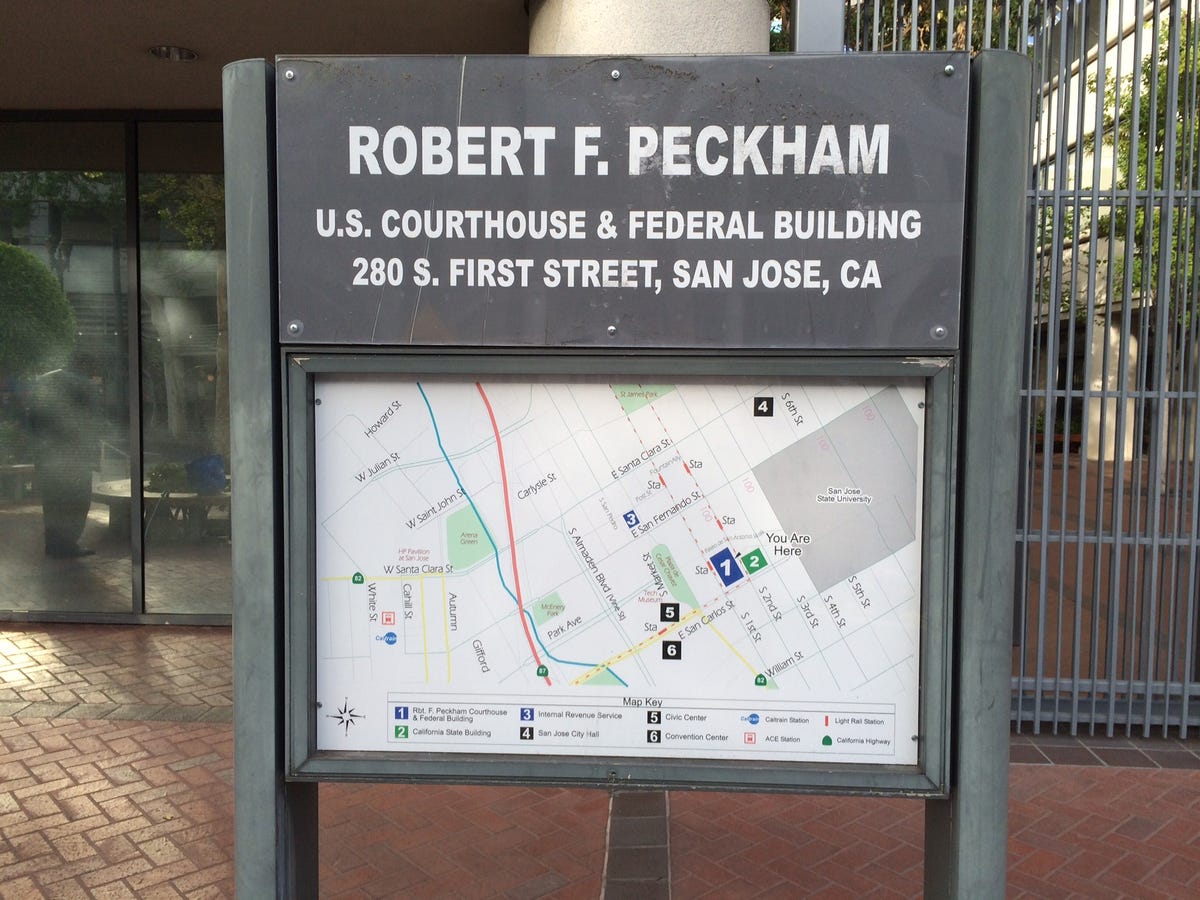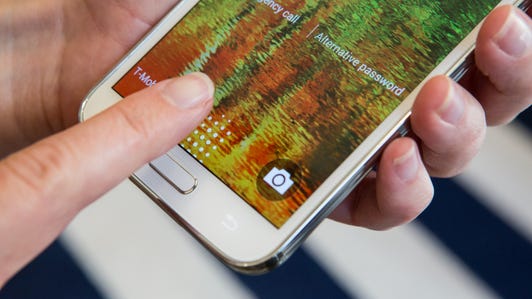
Vicki Behringer
SAN JOSE, Calif. — A jury should find that Samsung Electronics intentionally infringed on Apple’s patents because it didn’t have anything that could compete with the Cupertino, Calif., company, an Apple attorney argued Tuesday in a court here.
“Unlike in fairy tales, we know that Samsung’s illegal strategy has been wildly successful,” Apple attorney Harold McElhinny said during closing arguments. He noted that the mobile market has become a “two-horse race” beween Apple and Samsung and that Samsung has sold 37 million infringing devices.
McElhinny started his closing arguments by taking the jury back to 2007, the time of the first iPhone release. Apple created a “revolutionary” product in the iPhone and followed that up with another revolutionary device, the iPad, he said.
“These products were created by true geniuses like Steve Jobs and the Apple inventors who testified here,” McElhinny said. “They were, and are, real people who through genius and hard work have made real contributions to the way people…share information with each other.”
Apple v. Samsung 2014: The gadgets in question






He pointed out that no one from Samsung Electronics in Korea, the group that oversees the company’s mobile and other operations, came to testify, and that no one Samsung called could explain how Samsung created its phones.
“None of them were brave enough to come here and face cross-examination,” McElhinny said.
He also reiterated that the case isn’t about Google.
“Despite all the times Samsung mentioned it, you will not find a single question about Google in your jury form,” McElhinny said. “Google is not a defendant in this case.”
Samsung in its closing argument, however, disputed McElhinny’s claims, saying the company did call to the stand inventors of technology — including Google engineers and a designer from Korea. Attorneys for Samsung also argued that Samsung didn’t copy Apple’s patents, because Google created the technology first and Apple doesn’t even use the specific accused features in the iPhone.
“It’s true that if you don’t practice a patent, that doesn’t mean you can’t collect damages for it,” Samsung attorney Bill Price said Tuesday during Samsung’s closing arguments in the trial. “But you can’t copy something from the iPhone if it’s not in the iPhone.”
Almost two years after Apple and Samsung faced off in a messy patent dispute, the smartphone and tablet rivals have returned to the same courtroom here to argue once again over patents before Judge Lucy Koh. Apple is arguing that Samsung infringed on five of its patents for the iPhone, its biggest moneymaker, and that Apple is due $2.2 billion for that infringement. Samsung wants about $6.2 million from Apple for infringing two of its software patents, and it argues that if it did infringe all of Apple’s patents, it should have to pay only $38.4 million.
While the companies are asking for damages, the case is about more than money. What’s really at stake is the market for mobile devices. Apple now gets two-thirds of its sales from the iPhone and iPad; South Korea-based Samsung is the world’s largest maker of smartphones; and both want to keep dominating the market. So far, Apple is ahead when it comes to litigation in the US. Samsung has been ordered to pay the company about $930 million in damages.
Closing arguments were the final chance for Apple and Samsung to make their pitches to the jury in the current case. The month-long trial, with about 52 hours of testimony, has covered a lot of ground — from the invention of technology to what damages should total — and the jury will need a refresher to steer them toward a verdict. Apple has argued throughout the trial that its case is about Samsung, not Google, and that Samsung copied Apple out of desperation. Samsung, meanwhile, has argued that Apple’s suit is about hurting competition and Android.
See also
- Apple v. Samsung: All you need to know about latest patent trial (FAQ)
- Ruling in Apple v. Motorola throws wrench in Apple v. Samsung
- Google agreed to pony up for Samsung’s defense against Apple
- FaceTime creator details its history, including code name
- Samsung drops iPad infringement claims, asks for less money
Both sides had two hours apiece to present their closing arguments. Apple presented its case against Samsung, and then Samsung presented its defense. The Korean company also presented its case accusing Apple of infringing, and Apple wrapped up the closings with its defense against Samsung’s claims. The companies finished closings at 2:46 p.m. PT, and the case was handed to the jury.
Apple attorney Bill Lee, in his closing to defend Apple against Samsung’s claims, said that Samsung was trying to devalue patents by asking for such little money for damages. And there was “not a shred of evidence that the patents were copied.”
“[Samsung] has attacked Apple. It has attacked science,” Lee said. “You heard the words in opening — dishonest, misleading, sham. Why does Samsung resort to those characterizations? Because the facts and the law are with Apple.”
Samsung says most features that Apple says infringe are items that are a part of Android, Google’s mobile operating system that powers Samsung’s devices. All patents except one, called “slide to unlock,” are built into Android. Apple has argued the patent infringement trial has nothing to do with Android. However, Samsung argues that Apple’s suit is an
and that Google had invented certain features before Apple patented them. It came out during the trial that Google has been helping Samsung fund its defense against a couple of Apple’s patent claims because of a “Mobile Application Distribution Agreement” for Samsung to use Google’s apps.
Suing Google wouldn’t get Apple far since Google doesn’t make its own phones or tablets. Instead, Apple has sued companies that sell physical devices using Android, a rival to Apple’s iOS mobile operating system. In particular, Apple believes Samsung has followed a strategy to copy its products and then undercut Apple’s pricing. While Apple isn’t suing Google, it expects that Google will make changes to its software if Samsung is found to infringe on patents through Samsung’s Android devices.
McElhinny on Tuesday accused Samsung of lying about getting help from Google. He also said Apple never declared a ” war on Android” despite an email from Steve Jobs that said otherwise.
“There is no such war on Apple’s part,” he said. “You saw an email that used those words, just a snippet…[but] it talks about a competitive war, making the retail experience better, making more sales.”
He also said evidence contradicted testimony from Samsung’s witnesses.
“Every point Samsung has tried to make in this trial is contradicted by its own documents,” McElhinny said. “Their witnesses say ‘A,’ their documents say ‘B’…but somehow that does not seem to embarrass them.”
Meanwhile, an appeals court ruling April 25 in Apple’s related patent infringement suit against Motorola threw a wrench in the Apple v. Samsung case, extending the duration of the trial by one day to give the parties one additional hour each — on top of the 25 apiece they already had — to present more evidence. The US Court of Appeals for the Federal Circuit on Friday upheld a ruling by Judge A. Posner of the Northern District of Illinois that determined a specific interpretation of Apple’s ‘647 “quick links” patent. Koh had allowed the patent, particularly the use of an analyzer server, to be interpreted in a way in the current trial that differed from Posner’s accepted meaning, so she allowed Samsung and Apple to address the patent Monday.
Related links
- Samsung doc: Beating Apple was ‘survival strategy’
- Google exec: We never copied iPhone features for Android
- Apple: Samsung should pay us $2.191B for infringement
- Apple rests case vs. Samsung after expert makes pitch on damages
- Apple expert: iPhone-like features boosted Samsung phone sales
Apple recalled Todd Mowry, a professor computer science at Carnegie Mellon University, to argue that even with a different interpretation of analyzer server, Samsung infringed Apple’s patents. Samsung attorneys tried to show inconsistencies in Mowry’s testimony, and they recalled their own witness, Kevin Jeffay, professor of computer science at the University of North Carolina, Chapel Hill, to testify about the technology.
Jeffay, in his first moments of testimony, said he’d held a certain view of analyzer server the entire course of the case, but the court wouldn’t allow him to talk about it. Koh and Apple’s attorneys took issue with the statement, with Koh determining that Jeffay never adopted the definition from Posner. She struck his testimony after the lawyers argued over the issue for nearly half an hour.
In the current case, Apple and Samsung have accused each other of copying features used in their popular smartphones and tablets, and the jury will have to decide who actually infringed and how much money is due. This trial involves different patents and newer devices than the ones disputed at trial in August 2012 and in a damages retrial in November 2013. For instance, the new trial involves the iPhone 5 , released in September 2012, and Samsung’s Galaxy S3 , which also debuted in 2012.
There are seven patents at issue in the latest case — five held by Apple and two by Samsung. Apple has accused Samsung of infringing US patents Nos. 5,946,647; 6,847,959; 7,761,414; 8,046,721; and 8,074,172. All relate to software features, such as “quick links” for ‘647, universal search for ‘959, background syncing for ‘414, slide-to-unlock for ‘721, and automatic word correction for ‘172. Overall, Apple argues that the patents enable ease of use and make a user interface more engaging.
Samsung, meanwhile, has accused Apple of infringing US patents Nos. 6,226,449 and 5,579,239. The ‘449 patent, which Samsung purchased from Hitachi, involves camera and folder organization functionality. The ‘239 patent, which Samsung also acquired, covers video transmission functionality and could have implications for Apple’s use of FaceTime.
The Samsung gadgets that Apple says infringe are the Admire, Galaxy Nexus , Galaxy Note , Galaxy Note 2, Galaxy S II, Galaxy SII Epic 4G Touch, Galaxy SII Skyrocket, Galaxy S3, Galaxy Tab 2 10.1, and the Stratosphere. Samsung, meanwhile, says the iPhone 4 , iPhone 4S , iPhone 5, iPod Touch (fifth generation) and iPod Touch (fourth generation) all infringe. It initially accused the iPad 2 , iPad 3, iPad 4, and iPad Mini of infringing its ‘239 patent, but it later dropped those claims.That also reduced the amount Samsung wanted in damages to $6.2 million from its originally requested $6.8 million.


Shara Tibken/CNET
The latest trial kicked off March 31 with jury selection. The following day featured opening arguments and testimony by Phil Schiller, Apple’s head of marketing. Other witnesses who have testified include Greg Christie, an Apple engineer who invented the slide-to-unlock iPhone feature; Thomas Deniau, a France-based Apple engineer who helped develop the company’s quick link technology; and Justin Denison, chief strategy officer of Samsung Telecommunications America. Denison’s testimony came via a deposition video.
Apple experts who took the stand over the course of the trial included Andrew Cockburn, a professor of computer science and software engineering at the University of Canterbury, New Zealand; and Alex Snoeren, a professor of computer science and engineering at the University of California at San Diego.
The crux of Apple’s case came with two expert witnesses, John Hauser, the Kirin professor of marketing at the MIT Sloan School of Management; and Christopher Vellturo, an economist and principal at consultancy Quantitative Economic Solutions. Hauser conducted a conjoint study that determined Apple’s patented features made Samsung’s devices more appealing, while Vellturo determined the amount of damages Apple should be due for Samsung’s infringement — $2.191 billion.
Samsung, which launched its defense April 11 after Apple rested its case, called several Google engineers to the stand to testify about the early days of Android and technology they created before Apple received its patents. Hiroshi Lockheimer, Google vice president of engineering for Android, said his company never copied iPhone features for Android. Other Google Android engineers, Bjorn Bringert and Dianne Hackborn, also testified about features of the operating system.
High-ranking Samsung executives, including former Samsung Telecommunications America CEO Dale Sohn and STA Chief Marketing Officer Todd Pendleton, also took the stand during the month-long trial. The two executives testified about Samsung’s marketing push for the Galaxy S2 and other devices, saying a shift in the Korean company’s sales and marketing efforts — not copying Apple — boosted its position in the smartphone market.
See also
- Judge denies Apple’s request to talk about how it uses patents
- Apple: Samsung made ‘false statements’ during opening argument
- Samsung: Apple ‘vastly overstated’ scope of patents
- Samsung: Apple’s case ‘is an attack on Android’
- Apple: Samsung patent case is not about Google
The latter half of the trial largely was experts hired by Samsung to dispute the validity of Apple’s patents and to argue that Samsung didn’t infringe. The experts include Martin Rinard, an MIT professor of computer science; Saul Greenberg, a professor of human computer interaction at the University of Calgary in Canada; and Daniel Wigdor, a computer science professor at the University of Toronto.
David Reibstein, chaired professor of marketing at the University of Pennsylvania’s Wharton School of Business, refuted Apple expert Hauser’s testimony from earlier this month. NYU Stern School of Business professor Tulin Erdem, meanwhile, also testified that she conducted her own studies, using eye tracking, to determine what devices consumers would buy. She concluded that Apple’s patented features didn’t boost desire for Samsung’s products.
Judith Chevalier, a professor of economics and finance at the Yale University School of Management who was hired by Samsung, said her analysis determined that a reasonable royalty for Samsung’s assumed infringement would be $1.75 per device, or $38.4 million overall. Apple had argued it deserved $40 per device for infringement as well as lost profits for a total of $2.191 billion.
After presenting its defense, Samsung on April 21 launched its own infringement suit against Apple. Dan Schonfeld, a professor of computer science at the University of Illinois at Chicago, then testified that Apple infringed the ‘239 patent in its iPhone through the use of FaceTime and a feature for attaching video to messages and mail. And Ken Parulski, another expert who was part of the Kodak team that developed the world’s first color digital camera, testified that Apple infringed another Samsung patent for organizing video and photos in folders.
James Storer, a professor of computer science at Brandeis University hired by Apple as an expert witness, then testified April 22 that Apple didn’t infringe Samsung’s patents. The company then called witnesses such as Apple engineers Tim Millet and Roberto Garcia to testify about the creation of technology used in iPhones and iPads. Millet serves as senior director of platform architecture at Apple, helping create the processors that power iOS devices. Garcia, meanwhile talked about the creation of the FaceTime technology that has been accused of infringing a Samsung patent.
Following the conclusion of closing arguments, the case was handed to the jury of four men and four women. The jury — made up of tech novices such as a police officer and a retired teacher who likes salsa dancing — will deliberate every business day until it has a verdict.
Update, 11:45 a.m. and 2:55 p.m. PT: Adds comments from McElhinny and information about Samsung’s opening argument and includes closing argument by Bill Lee.
Extreme closeup: Samsung’s Galaxy S5 (pictures)









